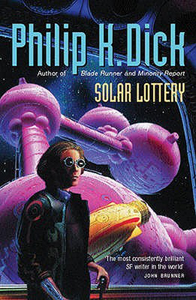“Solar Lottery” (written in 1954, published in 1955) isn’t too bad considering it’s Philip K. Dick’s first-published sci-fi novel, and it’s fun to see early examples of staples such as simulacra and telepaths. But while there is plenty to dig into if you want to decipher this 23rd century governmental system, I have to admit I didn’t understand all the nuances even by the end of the 200-page novel.
Oligarchy plus chance
This government resembles our current oligarchical system in the USA except that it adds an element of chance. Anyone who holds a p-card (power card) can have their name drawn in the titular lottery and then they will be the president of the solar system (called the Quizmaster for some reason).
Also, assassination is legal, but only if your name is drawn for that – or so we’re told for most of the book. Later on, this rule proves to be not so rigid. PKD’s failure to make the rules clear hampers the otherwise compelling drama that plays out between outgoing Quizmaster Verrick and newcomer Cartwright.

“Solar Lottery” (1955)
Author: Philip K. Dick
Composition year: 1954
Genre: Science fiction
Setting: 23rd century, Earth
The lottery system – devised by mathematicians at the time of World War II — is meant to give everyone an equal chance at holding power (1 in 6 billion in this case). But in reality, powerful people know how to game the system.
Although this broad point is well taken, PKD doesn’t explain the system’s specifics very well. The fact that rich people can buy the p-cards of poor people is clear, but the author also implies that the randomizer that selects new Quizmasters can be hijacked, and this part is not at all clear.
Skipping over money
The fealty system is another intriguing element of this future society, whose capital is based in Indonesia, renamed Batavia. Instead of contracts and monetary payment, people are directly repaid for their work with housing, food and a community. They can’t break their oath without penalty, but nor can their employer.
A person’s status is based on their skill set and how that skill set is valued in the current economy. And they can lose their status and become an “unk” (unclassified) if they break their oath. Unlike “classies,” “unks” have no rights.
“The Hunger Games” and “Divergent” series perhaps owe a debt to “Solar Lottery.” While there are lots of SF futures that describe rigid caste systems, those recent young-adult novel-and-film series are particularly built around “Solar Lottery’s” notion of a person being labeled one way by their government.
Being unclassified in the “Divergent” universe is a bad lot in life, too. And as with this novel, backstabbing statecraft is brought into the open and turned into mass entertainment in “The Hunger Games.”
Citizens have little control over their occupations and they are not allowed to change their minds about their employer in the “Solar Lottery” future. But beyond that, these people’s lives are similar to ours today. Bottom line: PKD goes to a lot of effort to say “Some things never change.”

Purposely plugged in
A particularly clever aspect of “Solar Lottery” – and the backbone of the book’s best action sequence — is something readers will recognize from “The Matrix,” in the parts where the free people (those no longer in pods) purposely plug into the Matrix.
Protagonist Ted Benteley swears an oath to longtime Quizmaster Verrick, and right after that, Verrick is bumped out of the top job — such is the luck of a PKD protagonist. Verrick assigns the disappointed Benteley to a team of 24 people who operate an assassin simulacrum named Pellig. Its goal is to kill the new Quizmaster, Cartwright.
Having 24 people randomly trade off remote-controlling Pellig means that it drives Cartwright’s teeps (telepaths) nuts. They can’t track the assassin. Of course, he can still be tracked by the conventional military means of simply keeping an eye on him.
The Pellig strategy personality benefits Moore, Verrick’s top scientific mind and perhaps the man who truly wields the power of the Quizmaster’s office. Although he claims the 24 controllers alternate at random, Moore actually controls it. So he can therefore make sure his rival Benteley is inside Pellig if Pellig is about to get “killed” – this would likewise kill Benteley.
And also: A space quest
Although some readers will criticize the thin connection to the main thread, I dig the search for the 10th planet that plays in the background. A now-deceased prophet named John Preston has predicted the existence of a 10th planet called Flame Disc that’s twice the distance from the sun as Pluto.
I think Flame Disc is supposed to represent hope for people who feel trapped by the governmental system of the nine planets; Cartwright’s first act in office is to send ships beyond Pluto, much like Jones in “The World Jones Made.” PKD fails to stick the landing of the Flame Disc thread – arguably it isn’t resolved at all — but I’m a sucker for the sense of the unknown that comes when humans venture where they’ve never gone before.
“Solar Lottery” is a compilation of brilliant ideas that don’t coalesce into a brilliant novel. I obviously agree with PKD’s point that people will chafe under any system that deprives them of choices. And the world-building is historically interesting as a precursor to recent YA hits, but it’s not all there.
Like one of the major characters who is left floating through space, “Solar Lottery” will likely drift out of your memory faster than most PKD novels.

